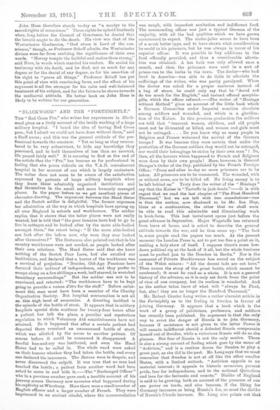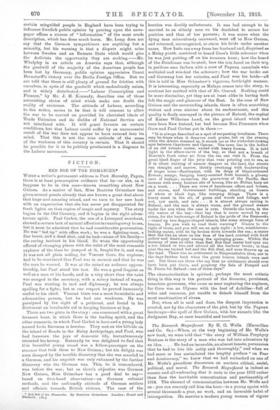"BLACKWOOD" AND THE "FORTNIGHTLY."
THE " Red Cross Pro." who writes her experiences in 131ac1e. wood gives us a lively account of the inside working of a large military hospital. "I hated the idea of having Red Cross pros., but I admit we could not have done without them," said a Staff nurse ; and this was the general attitude of the pro- fessional towards the amateur. " Yet so long as they remem- bered to be very subservient, to hide any knowledge they possessed, and to hold themselves of less than no account, life passed fairly well." It is amusing to find at the end of the article that the Pro." has become so far professional in feeling that she pours ridicule on the V.A.D. convalescent hospital in her account of one which is largely caricature. The writer does not seem to be aware of the satisfaction expressed by patients of large military hospitals when they leave those admirably organized. institutions and find themselves in the small and more humanly managed places. In the paper before us we get excellent pieces of character-drawing. The argument between the Head Sister and the Scotch soldier is delightful, The former expresses her admiration at the way in which hospitals have sprung up all over England in schools and workhouses. The soldier replies that it shows that the latter places were not really wanted, but is told that " the poor inmates have had to go to live in cottages and be looked after by the more able-bodied amongst them," the retort being : If the more able-bodied can look after the infirm now, why were they ever looked after themselves P" The Scotsman also pointed out that in his country workhouses were not needed, as people looked after their own relations. The Head Sister said that she knew nothing of the Scotch Poor Laws, but she extolled our institutions, and declared that a horror of the 'workhouse was a survival of prejudice. " Besides, Old-Age Pensions have fostered their notions' of independence, and they prefer to scrape along on a few shillings a week, half starved, in wretobed insanitary surroundings?' But the soldier was not to be convinced, and retorted; " The workhonees have to be kept going to provide a raison d'eitro for the staff." Before enlist- ment this man meat have been a member of the Charity Organization Society. But hospital conversation is not all in this high level of economics. A diverting incident is the episode of the bottle of stoat. It appears that in military hospitals special diets continue for twenty-four hours after a patient has left the place, a peculiar and mysterious regulation to which Voluntary Aid establishments have not attained. So it happened that after a certain patient had departed there remained an unoonsumed bottle of stout, which was allotted by the nurse to another patient. Of course before it could be consumed it disappeared. A fearful hue-and-cry was instituted, and even the Head Sister had to be called in. The whole ward were asked on their honour whether they bad taken the bottle, and every one declared his innocence. The Sisters were in despair, and never discovered the culprit. It was true that no man had touched the bottle ; a patient from another ward had been asked to come in and hide it.—The Exchanged Officer " who in a previous number gave such a terrible account of his Journey across Germany now narrates what happened during his captivity at Wiirzburg. Here there were a small number of E. nglish 011cers and a larger number of French. They were imprisoned in an ancient citadel, where the accommodation was rough, with imperfect sanitation and indifferent food. The commanding officer was just a typical German of the majority, with all the bad qualities which we have grown accustomed to expect, The under-jailer seems to have been of a much better type, and to have shown what consideration he could to his prisoners, but he was always in terror of his superior officer. It was possible to buy additions to the food officially provided, and thus a considerable allevia- tion was obtained. A hot bath was only allowed once a month, and then the prisoners were sent in a sort of prison-van to the baths in the town. The doctor—who bad lived in America---was able to do little to alleviate the sufferings of the writer, who was partly paralysed. When the doctor was asked for a proper mattress instead of a bag of straw, he could only say that he " dared not do too much for the English," and instead offered morphia.. pills, which the officer refused.—The writer of "Musings without Method" gives an account of the little book which a German Committee under Imperial sanction 'simulate among soldiers and wounded, and which is a glorifica- tion of the Kaiser. In this precious production the soldiers are told that " innocent women, children, and old people must not be ill-treated or killed, and women and girls must not be outraged. . . Do you know why so many people in Belgium and France welcomed the arrival of the German troops P It was because they were certain that under the protection of the German soldiers they would not be outraged, nor would their belongings be stolen by their own men" I So, then, all the horrors which happened to French and Belgians were done by their own people I Here, however, is General Stenger's Order of the Day, published by the French Foreign Office: "From and after to-day no more prisoners are to be taken. All prisoners are to be massacred. The wounded, with or without arms, are to be killed. off. No living enemy is to be left behind us." Truly does the writer of the " Musings" say that the Kaiser is " Tartuffe in jack-boots."—It is with regret that we read the last chapter of "The First Hundred Thousand," but we are left with two consolations—one is that the author, now disclosed to he Mr. Ian Hay, hints at a continuation, the other that we shall soon be able to read this admirable and illuminating work in book-form. This Last instalment opens just before the great advance in September. Major Wagstaffe has returned from leave at home, and is asked to describe the general attitude towards the war, and lie thus sums up: " The fact is, some people read the papers too much. At the present moment the London Press is, not to put too fine a point on it, making a holy show of itself, I suppose there's some low- down political rig at the back of it all, but the whole business must be perfect jam to the Beeches in Berlin." Nor is the comment of Private Muoklewaine less sound on the subject of the Welsh miners " All the decent lads are oot here." Then comes the story of the great battle, which cannot be condensed; it must be read as a whole. It is not a general history of the advance, as it is only set forth from the point of view of one company, but its realism is wonderful, And so the author takes leave of what will always be First, but, alas I they are no longer the Hundred Thousand."
Mr. Robert Crozier Long writes a rather alarmist article in the Fortnightly as to the feeling in Sweden in favour of joining Germany. It appears that a book which is the work of a group of politicians, professors, and soldiers has recently been published. Its argument is that the only way to avert the danger of Russia is to join Germany, because if assistance is not given to the latter Power itt will remain indifferent should a defeated Russia compensate herself out of Sweden, while a victorious Russia will do as she pleases. But fear of Russia is not the only motive. There is also a strong current of feeling which goes by the name of "Activism," and is a restless desire for Sweden to play a great part, as she did in the past. Mr. Long says that we must remember that Sweden is not at all like the other smaller States, with a. limited outlook. " Activism appeals to no material interest; it appeals to historic memories, present pride, fear for independence, and to the national Quixotism and love for the fantastic and remote." Dislike of England is said to be growing, both on account of the pressure of our sea power on trade, and also because, if the liking for Germany increases. ae being Russia's foe, so must the dislike of Russia's friends increase. Mr. Long also points out that certain misguided people in England have been trying to influence Swedish public) opinion by pouring upon the news- paper offices a stream of " information" of the most crude description, which has done much harm. Mr. Long does not say that the German sympathizers are anything but a minority, but his warning is that a dispute might arise between Sweden and an Entente State which would give the Activists the opportunity they are seeking.--Mr. Whelpley in an article on America says that, although the goodwill of the majority of the American people has been lost by Germany, public opinion appreciates Count Berristorfe'e victory over the Berlin Foreign Offioe. But we are told that there is still plenty of ground for friction with ourselves, in spite of the goodwill which undoubtedly exists, and is widely distributed.—" Labour Conscription and Finance," by Mr. J. M. Kennedy, describes one of those astonishing states of mind which make one doubt the reality of existence. The attitude of Labour, according to the writer, seems to be that it will consent to allow the war to be carried on provided its cherished ideals of Trade Unionism and its dislike of National Service are not interfered with. It will grant favours on certain conditions, but that Labour could suffer by an unsuccessful result of the war does not appear to have entered into its mind. That this is not the true attitude of the mass of the workmen of this country is certain. That it should be possible for it to be publicly proclaimed is a disgrace to the Labour movement.







































 Previous page
Previous page